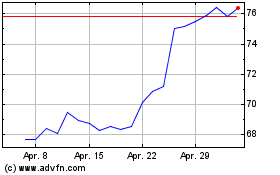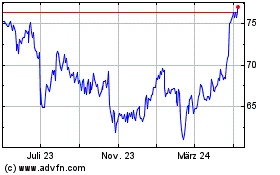AstraZeneca and Pfizer Ask India for Emergency-Use Covid-19 Vaccine Authorizations
07 Dezember 2020 - 3:14PM
Dow Jones News
By Eric Bellman
NEW DELHI -- The companies behind two of the most promising
Covid-19 vaccine candidates, AstraZeneca PLC and Pfizer Inc., have
asked India for emergency-use authorization to start using their
vaccines in the South Asian nation, which has been one of the worst
hit by the pandemic.
Both Pfizer and Serum Institute of India -- which is
manufacturing AstraZeneca's vaccine for developing countries --
have applied for the authorization, which would allow their
vaccines to circumvent a long trial and application process, said
an official at the Drugs Controller General of India.
"This will save countless lives, and I thank the Government of
India and Sri @narendramodi ji for their invaluable support," Adar
Poonawalla, chief executive officer and owner of SII, said in a
Tweet Monday.
If either gets authorization, it could be an important jump
start for the global manufacturing process as India is one of the
world's biggest vaccine manufacturers. The emergency authorization
would give its companies the ability and confidence to ramp up
production.
Serum Institute already has more than 40 million doses of the
AstraZeneca vaccine made and could have more than 100 million by
the end of the year, said a company spokesman.
The emergency authorization could release an initial wave of
vaccine from the stock that is already made. In theory it can
happen in as little as a week, but with the AstraZeneca vaccine,
Indian regulators may want to wait until it gets authorizations in
the U.K., said T. Jacob John, a retired professor of virology at
the Christian Medical College in the southern city of Vellore.
"There is no harm in rushing a drug, but it can't be rushed
before it is registered" in the country in which it was developed,
he said. "You can't rush when somebody else has to do it."
The U.K. asked its medicines regulator to review AstraZeneca's
vaccine, which it has developed with the University of Oxford, for
emergency-use authorization, last month. Pfizer's vaccine has
already been authorized by U.K. regulators, and approval of its
application for authorization to the U.S. Food and Drug
Administration is awaited.
Policy makers and regulators around the world are trying to get
vaccines to people as soon as they can and have been easing the
regular restrictions for bringing a new drug to market.
The regulatory race has been intensified by recent publication
of positive clinical data for three different vaccine candidates.
Two shots -- one from Pfizer Inc. and Germany's BioNTech SE, and
another from Moderna Inc. -- showed to be more than 90% effective
at preventing symptomatic Covid-19 in large-scale human trials.
Meanwhile, last month AstraZeneca said its vaccine registered as
much as 90% effective, but only among a small subset of subjects
who received a lower first dose of the two-shot regimen. In the
other group of trial subjects given two full doses, the vaccine
showed 62% efficacy.
India needs the vaccine more than almost any other country. It
has had more than 9.5 million confirmed coronavirus cases -- second
only to the U.S. -- and 140,000 deaths. Its economy has been hit
far more than most major economies as the pandemic has squeezed
consumer confidence and spending and pushed millions of people back
below the poverty line.
--Vibhuti Agarwal contributed to this article.
(END) Dow Jones Newswires
December 07, 2020 08:59 ET (13:59 GMT)
Copyright (c) 2020 Dow Jones & Company, Inc.
AstraZeneca (NASDAQ:AZN)
Historical Stock Chart
Von Jun 2024 bis Jul 2024

AstraZeneca (NASDAQ:AZN)
Historical Stock Chart
Von Jul 2023 bis Jul 2024
